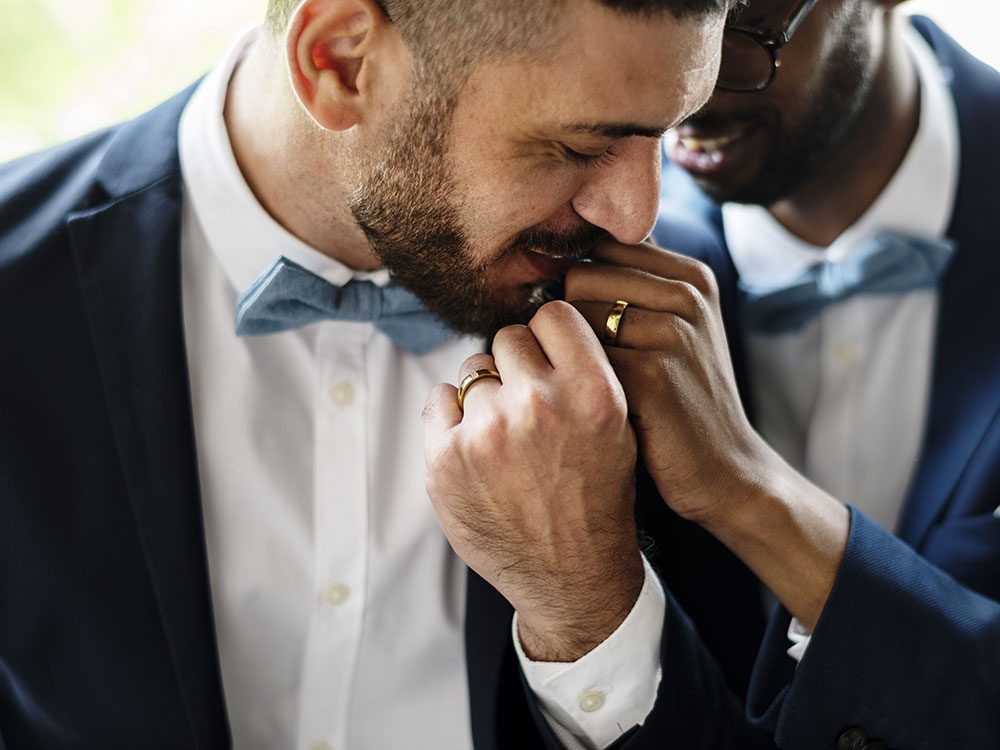
“Are you sure?”
People who identify as LGBTQ+ often struggle a great deal with their own feelings before they make the nerve-wracking decision to come out. Despite your best intentions, responding to this by asking, “Are you sure?” may be seen as calling into question the emotional journey that brought them to that point. Instead of expressing what might be interpreted as doubt, you could perhaps say, “It’s always good to know what you like and want. Thanks for coming out to me.”

“It must have been tough for your folks.”
Yes, it could have been tough for the parents. But guess what? It was harder on the individual for even longer—and in more intense ways than you can imagine. Staying in the closet is not a very comfortable position for a self-accepting person, but it’s an even harder journey to get to that point of self-acceptance. LGBTQ+ individuals have battled real fears of being attacked, abandoned, discriminated against and disadvantaged. In fact, LGBTQ+ youth are three times more likely to commit suicide than their heterosexual counterparts. Although it’s reasonable to show empathy for their parents, it’s poorly-timed here. Instead, try, “I hope you are coping well with your parents’ response. I am here to talk if you need to. Thanks for coming out me.”
Check out these rude conversation habits you need to stop ASAP.

“Why didn’t you tell me before?”
Well, it’s likely because they were afraid. It’s not because you are a monster, but because they love you and feared losing you as a result of coming out. The important thing is to not take it personally. When a loved one comes out, you are being called on to show targeted and urgent empathy. While your pain of being “left out” is real, it can wait a day or two. Right now, your focus should be how to celebrate your loved one’s life and the choices they’ve made, including the one of having just come out to you. Kick off the celebration by saying, “I am so proud that you have chosen to live your truth in front of me. Thanks for being authentic with me.”

“Are you the man or the woman in the relationship?”
More than anything, this question demonstrates a fundamental ignorance of the concept of same-sex love. It also misplaces the focus on the sexual act (rather than on identity) at a time when they’re in a vulnerable state. When a person comes out, they’re opening their hearts to you and sharing the emotional reality of who they are as individuals. Instead of asking this question, reinforce how grateful you are that the person has had the courage to come out to you, and say, “I accept you for who you are. Thank you for coming out to me.”
Brush up on the communication skills that will strengthen your relationships.

“Would you be my gay bestie?”
People who identify as LGBTQ+ can be good (or insufferable) company just like any other human being, but the point is, they are human beings and not objects or accessories as the pop culture depiction of the “gay bestie” might have you believe. Instead of this response, take this opportunity to reaffirm your loving, supportive relationship: “You are brave and honest, and this makes me respect you even more. Thanks for coming out to me.”
Discover three habits of highly compassionate people.

“I knew it!”
This particularly hurtful response is generally remarked when a “feminine” man or “butch” woman comes out. Many gender non-conforming individuals try very hard to either tone-down or manage their sexuality in public for fear of homophobia. By saying “I knew it!,” you’re inadvertently suggesting that their sexuality or gender non-conformity was being gossiped about behind their back in a sneaky, judgmental manner, which could, in turn, lead the person to feel that staying in the closet was a safer option than coming out. To avoid this situation, stick with a response of, “I’m honoured you chose to come out to me. Thank you.”
Here’s practical advice on how to rebuild self-esteem after your confidence has been shaken.

“But you’re so masculine!”
On the opposite end of the spectrum lies this response, indicating disbelief that a “manly” man could be gay, or that a “feminine” woman could be lesbian. Being in the closet is an alienating experience; responding to an individual’s coming-out with a comment that suggests they don’t conform to their “new” sexual identity either can be just as alienating. A better response could be, simply, “I didn’t know, but I’m so grateful you came out to me. Thank you.”
Next, read the heartwarming story of how Colin Mochrie’s daughter came out as trans.